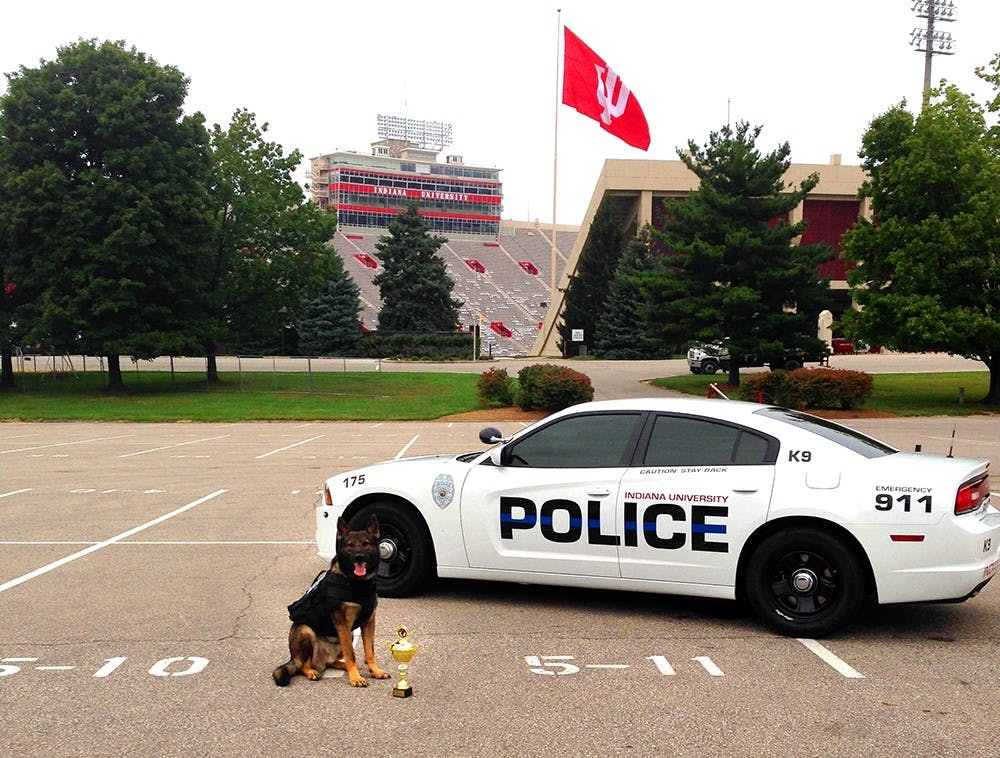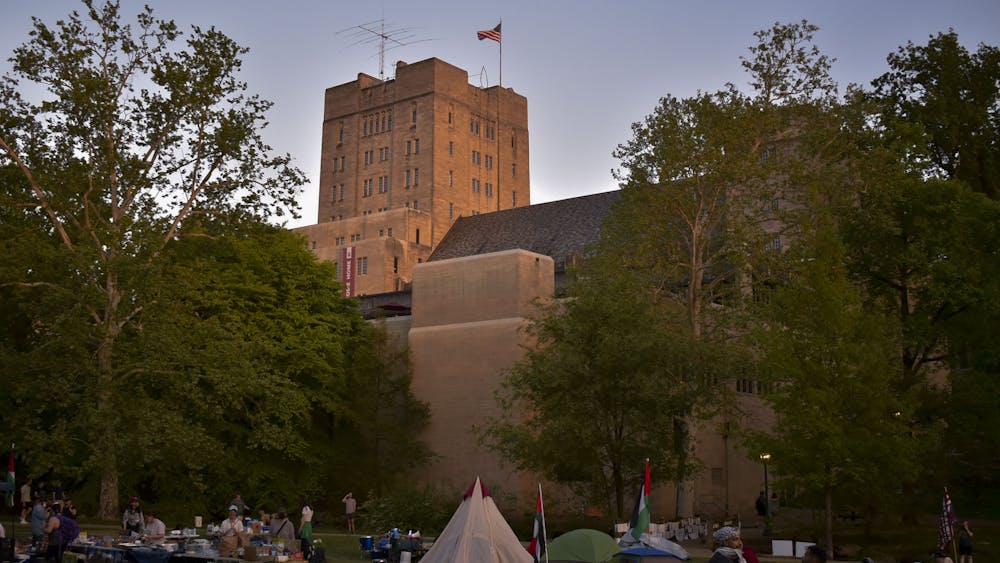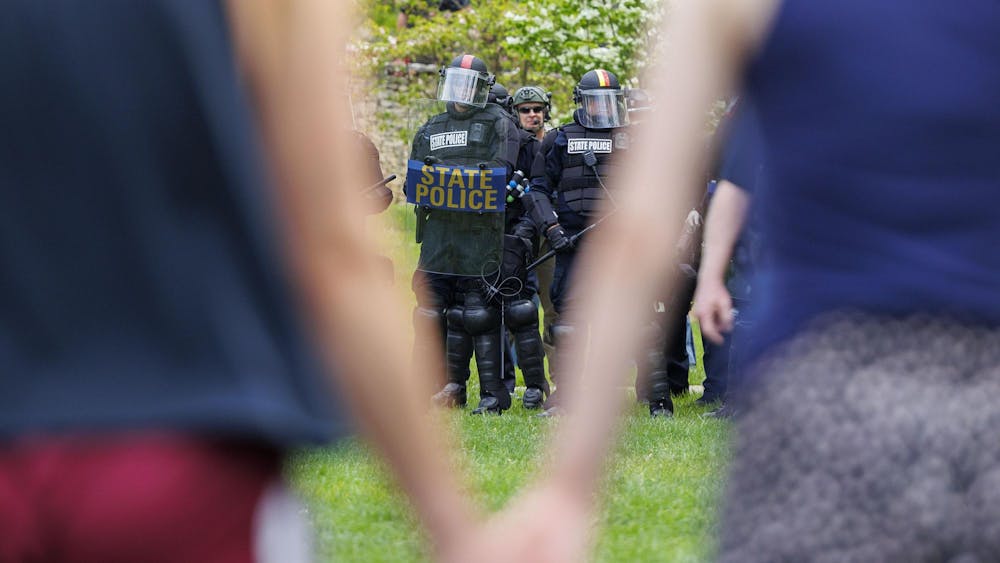He worked for his uncle’s law firm before he left, but upon arrival at IU, a friend told him about the IUPD Academy, the cadet program at IU.
He said he was curious and liked the idea of making extra money, so he signed up for the program beginning his sophomore year.
“And then I got into it, and I kind of just fell in love with it,” Collins said.
Since August 2005, when he began working with the cadet program while working toward majors in political science and criminal justice, Collins has been a part of IUPD.
Collins said cadets are the eyes and ears of the officers, and they need to be CPR certified and work on radio skills. Cadets act more as a uniform presence in locations such as the library and at events like football and basketball games.
Cadet training is a prelude to a summer spent at the police academy, Collins said. Following that, cadets are fully certified and expected to remain full-time students while working part time at IUPD.
After graduating from IU in 2008, Collins was hired full time by the department in 2009 to work street patrol. He maintained this position through November 2011 when he was promoted to field training officer and canine handler.
“My primary job is patrol officer,” he said.
Tery, Collins’ dog, has been working with him for three years. His fifth birthday was Sunday.
“I don’t know what I’m gonna do for him yet,” Collins said, smiling at the thought of his 82-pound German Shepherd.
Tery is trained for tracking and explosive detection, so he rarely gets put to work, Collins said.
Despite that, Tery is always ready.
Collins said he never really had any negative experiences with IUPD prior to working with them, mainly because his cadet program began during his sophomore year.
He recalled seeing IUPD show up to an incident at Forest Quad his freshman year, but he said they didn’t have an effect on his decision to join the IUPD Police Academy the following year.
Though Collins is currently working on the day shift, he said he had been on the night shift before.
“Day shift is kind of a relief for me,” he said.
To Collins, the night shift consists of different people doing the same thing almost every single night. There are a lot of things he said he cannot “unsee” from his time working nights.
“It’s more entertaining on the night shift for sure,” he said.
Collins said his day begins at 7 a.m. with roll call and briefings. In those briefings, officers are told what kind of things took place during the previous two shifts and what they should be on the lookout for.
As an example, Collins said if a hit-and-run accident should occur during the night involving a blue truck with a certain license plate number, day shift officers are told to be on the lookout for that truck during their shifts.
After briefings, he said officers are sent out to complete their own tasks until 3 p.m. when the shift ends.
“Everybody has their own little schedule,” Collins said.
Most officers have to set up their squad cars for the day by putting their equipment inside how they want it to be arranged, but Collins said his car is already prepped. He drives a take-home vehicle because Tery needs to be driven to work.
Once vehicles are prepped, he said officers disperse to a variety of areas, sometimes having to stop and make sure they have enough coffee to start their shift before they arrive.
Some officers will stake out a spot near a day care center or school to watch for people speeding near what should be a school zone, he said.
“It really is the officer’s prerogative (as to) what they want to do,” he said.
There is a lot of freedom, Collins added.
Despite the freedoms, each shift has its own communal dynamic, Collins said.
“It’s kind of like a high school sometimes,” he said, explaining that officers in the same shift are closer to each other than to other shifts.
Even though they spend most of the day working alone, they are all working for the same purpose, he said.
“We’re all friends, and we all work together,” Collins said.
Most people are type-A personalities, Collins said. For as many times as there are disagreements, there are even more moments of ?camaraderie.
“A lot of emotions can come and go amongst us,” Collins said.
Shifts tend to have their own inside jokes and comments that, at times, simply don’t transfer to other shifts, Collins said. They do all have fun with each other, he said.
The diversity of backgrounds of the officers also contributes to the strength of the force, Collins said. Personal experiences help each officer to look at situations with new perspectives and help to cover a variety of incidents.
“They weigh things differently,” Collins said.
For instance, an officer whose life was affected by a drunken driver may be more aware of drivers that appear to be intoxicated than an officer who has never been personally affected by a drunken driver, he said.
Collins said that is what the criminal justice system was designed to do. It checks and balances and covers as much area as thoroughly as possible to create a safe, protected community.
Collins said he knows the effect he and other officers can make on the community.
“I really like the ability to help somebody that wants to be helped,” he said.
Collins said it is difficult to try to help a person who is being difficult or unresponsive to authority, but when a person is grateful for his help or even comes down to the office to thank him and his fellow officers, he knows he has done his job.
“I joke with people that unlike the rest of America, I don’t hate my job,” Collins said.
A lot of times, somebody receiving a speeding ticket doesn’t realize officers don’t benefit from giving out tickets, Collins said. The only reason he issues tickets is to hopefully encourage safer driving in the future.
Not getting through to people in the way he is hoping to, like issuing speeding tickets, is often frustrating, Collins said.
Outside of these interactions and the occasional minor frustration brought on by weather or long days, Collins said he genuinely enjoys his work with IUPD.
Working 24 straight hours during the overlap of football and basketball season is hard for a person, Collins said, but he is never really angry at work because of work.
He said the freedom to do what he thinks will best serve the community outweighs any frustration he feels during the work day.
Collins said he knows the community well since he has been here for 10 years now.
“I can relate to it, and I can understand their thought process,” he said of college students that end up on the wrong side of the law.
While he doesn’t understand most of their problems from personal experience, he said he does understand the “why” behind most decisions people make.
Though Collins said he never intended to become an officer when he started college, now that he is here, he isn’t planning on going ?anywhere.
“I would like to stay with this department and get promoted,” Collins said, explaining that the next rank up for him would be sergeant.
In the long term, he said he has considered moving to Florida to open a business, but for now, Collins said he is happy where he is.
The perks and benefits of this job, even down to experiencing the culture of the Bloomington community at sporting events and games, really add to what can be at times a tiring job, he said.
Collins paused for a moment and said that 10 years seems like a really long time to him, but that he is happy to be here.
“We are here to help and support the community,” Collins said.
Though working for a police department is never easy, Collins said he is proud to be providing this service to the community.
“I think Bloomington is the best place in the state to live and work,” he said.






